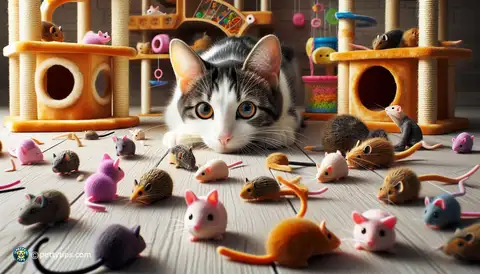
Feeding Strategies to Satisfy a Cat's Hunting Instincts
Gabriel Wallace - Sep 29, 2024 - 5 min read


Socialization in cats is a fascinating and intricate process that begins at birth and continues throughout their lives. Kittens learn crucial social skills from their mothers and littermates during the first few weeks of life. This early exposure helps shape their behavior and interactions with other cats and humans. As they grow, cats further refine their social skills through experiences and interactions in their environment.
Early experiences play a pivotal role in shaping a cat's social behavior. Positive interactions during kittenhood, such as gentle handling and exposure to various stimuli, can foster confidence and sociability. Conversely, negative experiences or lack of socialization during this critical period may lead to fearfulness, aggression, or other behavioral issues later in life. Understanding the importance of early socialization can help cat owners provide the necessary support and guidance to ensure their feline companions grow into well-adjusted adults.
Several factors influence a cat's social behavior, including genetics, environment, and individual personality traits. While some cats are naturally outgoing and sociable, others may be more reserved or cautious. Genetics play a role in determining a cat's temperament, but environmental factors, such as upbringing and socialization experiences, also significantly impact their behavior. Recognizing and accommodating these differences can help create a harmonious environment for cats with varying social needs.
positive reinforcement plays a crucial role in shaping a cat's social behavior. Rewarding desirable behaviors, such as friendly interactions and calm demeanor, encourages cats to repeat these actions. Conversely, punishing or scolding undesirable behaviors can lead to stress and anxiety, potentially exacerbating socialization issues. By using positive reinforcement techniques, cat owners can effectively encourage their pets to engage in desirable behaviors and build trust and rapport with them.
building trust is essential for fostering a strong bond between cats and their owners. Trust is earned through consistent and positive interactions that promote feelings of safety and security. Taking the time to understand a cat's individual preferences and respecting their boundaries can help establish trust and strengthen the human-feline bond. Patience, empathy, and a willingness to communicate on their terms are key elements in building trust with cats.
Creating a safe and enriching environment is paramount for promoting socialization and well-being in cats. Providing ample hiding spots, vertical space, and opportunities for exploration and play allows cats to express natural behaviors and alleviate stress. Additionally, minimizing exposure to potential stressors, such as loud noises or unfamiliar animals, can help cats feel more comfortable and secure in their surroundings. By creating a conducive environment, cat owners can support their pets' socialization efforts and enhance their overall quality of life.
Encouraging positive interactions between cats and their owners is essential for strengthening the bond and fostering mutual trust. Engaging in interactive play sessions, offering treats as rewards, and providing affectionate gestures, such as gentle petting and verbal praise, can help reinforce positive associations and build confidence in cats. It's essential to respect a cat's cues and preferences during these interactions, allowing them to dictate the pace and intensity of engagement.
Establishing a consistent routine can help cats feel secure and confident in their environment. Consistency in feeding times, play sessions, and social interactions provides cats with a sense of predictability and stability, reducing anxiety and promoting overall well-being. By adhering to a regular schedule and providing structure in their daily lives, cat owners can help their pets feel more comfortable and relaxed, facilitating socialization and bonding opportunities.
Understanding the signs of fear and anxiety in cats is crucial for addressing socialization challenges effectively. Common indicators include hiding, hissing, growling, and avoidance behaviors. Identifying the root cause of these emotions, whether it be unfamiliar environments, new people or animals, or past traumas, is the first step in addressing them. By recognizing and acknowledging their fears, cat owners can take proactive measures to help their pets feel safe and secure.
Gradual exposure and desensitization techniques can help cats overcome fear and anxiety related to specific stimuli or situations. Slowly introducing cats to unfamiliar people, animals, or environments in a controlled and positive manner allows them to acclimate at their own pace. Using treats, toys, and praise as rewards for calm and confident behavior reinforces positive associations and helps cats feel more comfortable in challenging situations. Patience and consistency are key when implementing desensitization protocols, as progress may take time and require ongoing support and encouragement.
In some cases, addressing socialization challenges may require the assistance of a professional animal behaviorist or veterinarian. These experts can provide guidance and support tailored to the individual needs of the cat and their owner. behavior modification techniques, medication, and specialized training programs may be recommended to address underlying issues and promote positive socialization experiences. Seeking professional help early can help prevent escalation of behavioral problems and improve the overall quality of life for cats and their owners.
Above all, patience and persistence are essential when addressing socialization challenges in cats. Building trust and fostering positive relationships takes time and dedication. It's important for cat owners to remain patient and understanding, even when progress seems slow or setbacks occur. By consistently providing love, support, and encouragement, cat owners can help their pets overcome socialization obstacles and thrive in their relationships with humans and other animals.
Understanding the science behind cat socialization is key to fostering strong bonds and promoting positive relationships between cats and their owners. By recognizing the importance of early experiences, positive reinforcement, and environmental enrichment, cat owners can support their pets' socialization efforts and enhance their overall well-being. Building trust, creating a safe environment, and addressing socialization challenges with patience and persistence are essential steps in nurturing happy and confident cats. With dedication and love, cat owners can help their feline companions lead fulfilling lives as valued members of the family.